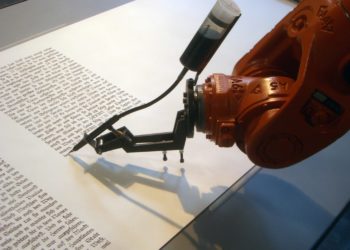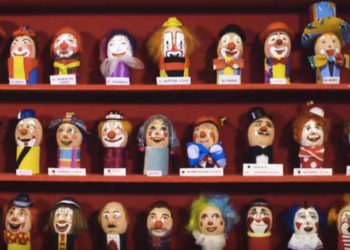The number of notes on the musical scale offers a finite number of combinations that can be used to generate a melody. Whether you’re George Harrison or Vanilla Ice, infringing on the melody someone else found first can be rather costly. Damien Riehl and Noah Rubin argue that songwriters spend every day navigating a potential copyright minefield, as every melody they compose could land them in court. To address this, they developed an algorithm that uses a brute force approach to generate every possible melody, which they’ve subsequently released under CC0 license to the public domain. The code for the algorithm and the datasets of melodies are openly available. They suggest that since they’re doing this in MIDI form, the notes are just numbers:
“Under copyright law, numbers are facts, and under copyright law, facts either have thin copyright, almost no copyright, or no copyright at all,” Riehl explained in the talk. “So maybe if these numbers have existed since the beginning of time and we’re just plucking them out, maybe melodies are just math, which is just facts, which is not copyrightable.”
Presumably, any songwriter can reuse these public domain melodies without fear of reprisal. While it remains an open question of how a court would treat these in an actual case about an infringed melody, it’s a clever hack and raises questions about creativity in a machine and artificial intelligence dominated era. In the video below, Riehl explains the project.
Discussion
7 Thoughts on "Every Pop Melody Possible is Now in the Public Domain"
Sorry, I don’t buy this premise in the slightest. Copyright requires a “threshold” of original expression to be met. A directory of all the melodies (whatever that means) doesn’t express anything, let alone anything original. My verdict is No.
My inference is that Riehl & Rubin’s algorithmic effort is intended as some sort of send-up of the application of copyright rules to popular music, a critique I can appreciate. I am not persuaded, for example, that Marvin Gaye or the Chiffons wrote everything already.
But to me, this whole thing seems like a /reductio ad absurdum/, played out in TED-style.
Dave Davis is spot on, and that in my opinion is the intended result. We’ve been discussing these issues with Damien on our listserv (Pho), and it seems this is what they hoped might occur.
To be clear, it would need to be copyrightable for the “authors” to claim they own it such that they could dedicate it to the public domain, which isn’t a clear option at all — if copyrightable, works are copyrighted automatically at fixation, and yet experts agree this fill in the blanks, algorithm-driven approach is simply not copyrightable in the first place. If you clear that hurdle (this doesn’t), how do you transfer it to the public domain? Or are they conflating Creative Commons licensing (which also depends upon copyright) with public domain?
Damien is super smart, a trifecta of a lawyer, technologist and musician.
Should a granular, algorithmic-generated set of notes deserve the designation as someone’s property, stripped as it is of creativity or context? As probative evidence in the context of a full song or sound recording, perhaps yes, but absent that context is it simply necessary, but not sufficient.
One could do the same thing with the 26 letter alphabet, as there is only a finite number, however large it may be, of combinations of letters and spaces and words. Would these witty guys then argue that a computer file which generated every possible combination of words and punctuation would then put every possible future novel in the public domain before it was even written?
But why stop there? There is also a finite number of possible combinations of chemicals, molecules, and atoms. If we write a computer program that simply crunches all of the possible variations and prints them out, does that negate all future patent applications?
This is what happens when people obsessed with Open Access think that they are smarter than they are. The end result of this project, were it to stand up in court, would be the end of any incentive to create anything. The time would have been better spent learning to play that guitar rather than pondering the math behind scales.
Riehl claims several times that his underlying intention is to make it possible for songwriters to keep writing. It’s astonishing, then, that he doesn’t address the glaring problem with his project: that if his arguments were to hold water legally, he would be destroying any songwriter’s ability to make a living out of their talent. If all your tunes are in the public domain before you start, bang go your royalties. Maybe that seems less important to Riehl, with his side gigs in programming and law.
He presents copyright lawsuits as an almost inevitable part of any songwriter’s life. If that were so, music would already be dead. The cases he cites are all well known. I am not convinced that the courts are clogged up with similar claims.
I’m also not impressed by the argument that rhythm is irrelevant. The examples of infringement he cites all have a feature in common: the rhythms of the melody and its claimed copy are near enough identical. Of course, variations in rhythm can in theory be built into the algorithm, as he says, but that would expand the mathematical space of possible melodies astronomically, to the extent that it makes a mockery of his claim that we are running out of melodies.
Reihl also mentions, but then glosses over, another major problem, which is that he has no way of knowing which subset of the generated melodies are already copyrighted. I’ve written quite a few tunes myself, and am not impressed that he seems to be telling everyone that they in the public domain – they emphatically aren’t! Maybe I should sue…
Isn’t *time* also a factor in music? In which case any particular melody isn’t simply the arrangement of a set of notes, but also the (relative) duration of each of those notes. If you change the relative duration of the notes in “Happy Birthday”, then pretty soon it doesn’t sound a bit like the familiar refrain. And since time is potentially infinite, how can a single finite dataset possibly contain every conceivable melody? But maybe the law hears things differently….
This TEDx speaker often uses the term ‘note’, when he should use the term ‘tone’. DO RA MI FA SO LA TE DO are ‘tones’, not ‘notes’. A note is a compound of tone + duration. If you add in duration variables, he has not come close to exhausting all melodies.
But there is value in this presentation.


